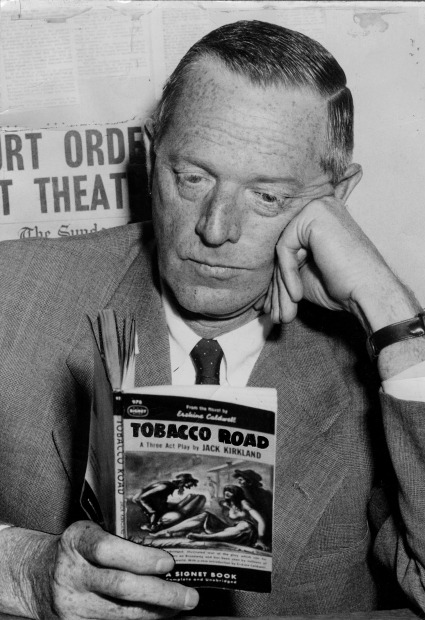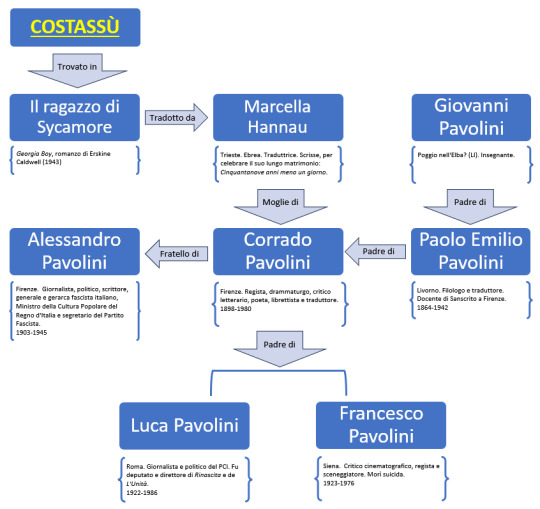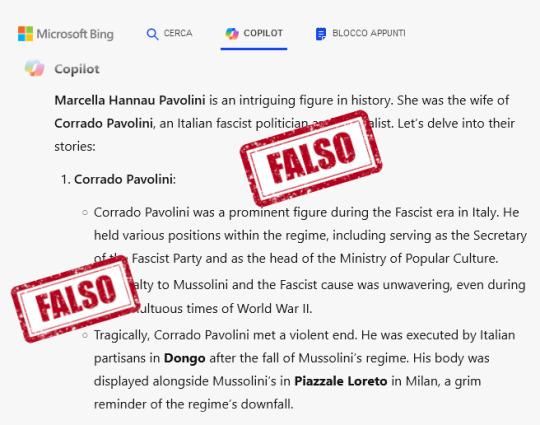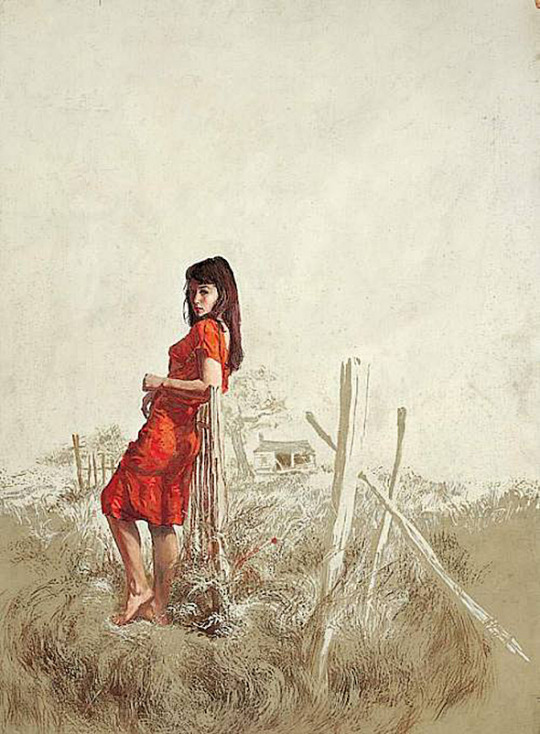#Erskin Caldwell
Explore tagged Tumblr posts
Text
Gli abiti dell'uomo erano gualciti e coperti di polvere. La faccia, che sembrava di cuoio, aveva un colore come se vi avessero spruzzato sopra della tinta marrone (Erskine Caldwell, Il predicatore vagante).
9 notes
·
View notes
Text
Erskine Caldwell: Beyond Tobacco Road
A look today at the much-neglected progressive Southern author Erskine Caldwell (1903-1987), born 120 years ago today. Caldwell was decidedly not neglected in his own time; that’s the whole point. His most popular books and adaptations thereof broke records; we’ve had dozens of occasions to mention his most famous one on this blog. To sell that point, we’ll talk about the famous works first, and…

View On WordPress
#author#book#Erskine Caldwell#God&039;s Little Acre#novel#sharecroppers#south#Tobacco Road#writer#You Have Seen Their Faces
2 notes
·
View notes
Text
No quiero molestarte, Griselda- dijo TyTy pero en cuanto empiezo a hablar de ti, no puedo parar. Sólo quiero alabar tu hermosura. Y creo que lo haría cualquier hombre que te haya visto como yo. La primera vez que te vi, cuando Buck te trajo de allá de donde vengas, me entraron ganes de arrojarme al suelo y ponerme a lamer cualquier cosa. Es una ensación muy rara para un hombre y, cuando me asalta, me enorgullezco de poder contarlo.
0 notes
Text
Erskine Caldwell (1903-1987)
Ik ben op dit moment “Tobacco Road” aan het lezen, het bekendste werk van de Amerikaanse schrijver Erskine Caldwell (foto Giorgio Lotti (Mondadori Publishers) – http://www.gettyimages.co.uk/detail/, nu behorend tot het publiek domein). Continue reading Untitled

View On WordPress
0 notes
Text

James Avati (American,1912-2005)
Paperback cover for "The Humorous Side of Erskine Caldwell", 1951
162 notes
·
View notes
Text
Basta una parola

Scriveva Abatelunare, una decina di giorni fa, che spesso leggendo un libro si imparano delle parole nuove, e faceva riferimento a un toscanismo: costassù, trovato in una vecchia versione de Il ragazzo di Sycamore di Erskine Caldwell.
A me occorre poco, appena una parola, per impantanarmi in una serie di percorsi da cui poi faccio fatica a uscire; così è stato anche questa volta.
Infatti, in sintesi:
Da toscano conosco e uso la parola costassù, così come anche gli altri avverbi costì, costà, costaggiù; ricordo bene come, una decina di anni fa, me ne chiese il significato una collega, di madrelingua inglese, da poco arrivata a Siena.
Più di recente, saranno passati tre o quattro anni, durante una lettura condivisa de La vita agra del grossetano Luciano Bianciardi, le due amiche con cui leggevo, una di origine siciliana ma da anni a Napoli, l'altra veneta, mi chiesero lumi su due strane parole in cui si erano imbattute in quel testo: costì e costassù.
Ho chiesto ad Abatelunare chi avesse tradotto il libro, sospettando appunto un toscano, e mi ha indicato Marcella Hannau. Il mio sospetto era ben fondato, anche se non corretto, perchè la Hannau era nata a Trieste ma ha avuto frequentazione lunga e anche intima con la Toscana.
Le ricerche fatte mi hanno portato subito in ambiente fiorentino; la Hannau, traduttrice dall'inglese di oltre una settantina di libri, figlia di uno stakholder della Standard Oil, di famiglia ebraica, sposò molto giovane [nel 1921] Corrado Pavolini, nato a Firenze: regista, drammaturgo, critico letterario, poeta, librettista e traduttore. Corrado era figlio del professor Paolo Emilio, traduttore e docente universitario di Sanscrito, nato a Livorno da padre dell'isola d'Elba. La coppia frequentava l'ambiente culturale italiano del tempo: ci sono ad esempio foto degli anni '30, sulla spiaggia di Castiglioncello, sempre in Toscana (Livorno) in compagnia di Luigi Pirandello, Nicola De Pirro, Marta Abba, Maria Stella Labroca e Silvio D'Amico; le due famiglie, Hannau e Pavolini, frequentavano spiaggia, locali e ville di amici nella zona, già dalla fine degli anni 10 dello scorso secolo.
Corrado Pavolini era il fratello del gerarca fascista Alessandro, Ministro della Cultura Popolare e segretario del Partito Fascista.
Alessandro si rifiutò di aiutare il fratello e la cognata Marcella nel momento della promulgazione delle leggi razziali e Corrado e Marcella scapparono a Cortona (Arezzo) rifugiandosi nella villa dell'amico Debenedetti. A Cortona trovarono un buon nascondiglio anche gli Hannau, i genitori di Marcella, a cui offrì riparo il Vescovo, Monsignor Franciolini, direttamente nella sua abitazione.
Cortona piacque così tanto alla coppia Pavolini-Hannau che fecero della villa "del Bacchino" un loro punto di riferimento a guerra finita e poi, dal 1961, la loro residenza. Ecco come, con tutte queste frequentazioni toscane, la Hannau abbia potuto utilizzare parole ancora in uso nell'italiano del tempo, adesso segnalate dalla Treccani come semplici "toscanismi" vista la loro odierna più ristretta circolazione.
Restano da citare, in questi miei giri intorno alla coppia, due notiziuole "rosa": l'infatuazione per Corrado Pavolini, prima da parte di Anna Maria Ortese, poi di una sua carissima amica, Helle Busacca. [Interessante e rivelatrice questa pagina di Dario Biagi]. Su questo ramo della ricerca mi sono fermato, perché infiniti altri percorsi mi si sono aperti, relativi ai personaggi della cultura italiana dell'epoca e dei loro rapporti di amicizia, rivalità od odio.
Nonostante le ricerche sul web, non sono riuscito a trovare informazioni certe sulle date di nascita e di morte di Marcella Hannau; ho pensato allora di utilizzare il Copilot di Microsoft Bing. L'Inintelligenza Artificiale si è data da fare ma le date che cercavo non me le ha recuperate; in compenso ha tratteggiato un profilo, sintetico ma efficace, del marito Corrado. Peccato, però, che, da brava Inintelligenza, si sia confusa e abbia scritto i dati relativi ad Alessandro Pavolini, il gerarca titolare del MinCulPop e Segretario del Partito Nazionale Fascista, che fu processato per collaborazionismo, fucilato e poi esposto, insieme a Mussolini e alla Petacci, a Piazzale Loreto...

*Aggiornamento del 29/03/2024: Corrado Pavolini e Marcella Hannau riposano ora l'uno accanto all'altra nel piccolo cimitero del Torreone al sommo della collina di Cortona.
18 notes
·
View notes
Text

Preliminary and final cover art by James Avati for Erskine Caldwell's "Gretta" (Signet Books #1342), 1956.
31 notes
·
View notes
Text
Birthdays 12.17
Beer Birthdays
Thomas Cooper (1826)
George Frey (1826)
Balthas Jetter (1851)
Michael Ash (1927)
Yuri Katunin
Five Favorite Birthdays
Milla Jovovich; Russian model, actor (1975)
Mike Mills; rock bassist (1958)
William Safire; writer (1929)
John Kennedy Toole; writer (1937)
John Greenleaf Whittier; poet, writer (1807)
Famous Birthdays
Burt Baskin; ice cream maker (1913)
Paul Butterfield; blues musician (1942)
Paul Cadmus; artist (1904)
Erskine Caldwell; writer (1903)
Domenico Cimarosa; composer (1749)
Sarah Dallin; pop singer (1961)
Humphrey Davy; English chemist (1778)
Earl Dotson; Green Bay Packers T (1970)
Peter Farrelly; film director, writer (1956)
Arthur Fiedler; conductor (1894)
William Floyd; signer of the Declaration of Independence (1734)
Ford Madox Ford; English writer (1873)
Duff Goldman; pastry chef (1974)
Bob Guccione; magazine publisher (1930)
Thomas C. Haliburton; Canadian writer (1796)
Joseph Henry; scientist, inventor (1797)
Bernard Hill; actor (1944)
Ernie Hudson; actor (1945)
Eugene Levy; writer, actor, comedian (1946)
Willard Libby; atomic scientist (1908)
George Lindsey; comedian, actor (1928)
Armin Mueller-Stahl; German actor (1930)
Art Neville; R&B musician (1937)
Sy Oliver; trumpet player, bandleader (1910)
Sarah Paulson; actor (1974)
Bill Pullman; actor (1953)
Giovanni Ribisi; actor (1974)
Paul Rodgers; rock singer, pianist (1949)
Tommy Steele; pop singer (1936)
2 notes
·
View notes
Note
for irish authors: naoise dolan (genre similar to sally rooney but better imo), michael magee (close to home was my favorite novel i read last year), wendy erskine (short story writer about to publish her first full length novel), lucy caldwell (i prefer her short stories but she also writes novels); for some of the more classic irish writers: brendan behan, roddy doyle, seamus deane, brian friel
you all have really come through for me on irish author suggestions this is so awesome 🫶🫶🫶 thank you so much!!!!!
5 notes
·
View notes
Text
- Voi dite agli altri quello che non devono fare, ma poi andate avanti a fare le stesse cose per conto vostro. (Erskine Caldwell, Il predicatore vagante).
16 notes
·
View notes
Text



James Avati - cover art for A House in the Uplands by Erskine Caldwell
11 notes
·
View notes
Text
Robert Penn Warren and "All the King's Men"
The 20th century produced so many great Southern chroniclers of crackerdom (William Faulkner, Thomas Wolfe, Tennessee Williams, Harper Lee and childhood friend Truman Capote, James Agee, Katharine Ann Porter, Flannery O’Connor) you will perhaps forgive me for placing Robert Penn Warren (1905-1989) at the back of the pack, near the likes of Margaret Mitchell and Erskine Caldwell. I remind you that…

View On WordPress
#All the King&039;s Men#author#book#Huey Long#movie#play#politician#Robert Penn Warren#Trinity Rep#Willy Stark
3 notes
·
View notes
Text
Composer and conductor, Elmer Bernstein, was American. He composed "some of the most famous and unforgettable themes in Hollywood history" during a career spanning more than five decades. His work includes over 150 actual movie scores as well as soundtracks for about 80 television projects. He got an Academy Award and a Primetime Emmy for his contribution on Thoroughly Modern Millie (1967). He was nominated for two Tony Awards, and five Grammy Awards, and got seven Golden Globe nominations. Elmer Bernstein Early Life: Born into a Jewish family in New York City, Bernstein was the son of Austria-Hungarian-born Edward Bernstein (1896–1966) and Selma (née Feinstein, 1901–1991; born in Ukraine). Bernstein worked professionally as a dancer, an actor (playing Caliban in The Tempest on Broadway), and a painter while still in his early years. He also won awards for each of these pursuits. He was a music enthusiast who went to the forward-thinking Walden School in Manhattan. Henriette Michelson, a Juilliard teacher who helped him for the entirety of his piano career, gave him a piano scholarship when he was twelve years old. She brought him to perform some of his improvisations for the composer Aaron Copland, who was supportive and chose Israel Citkowitz to be the little boy's tutor. Elmer composed music for the Armed Forces Radio while serving in the United States Army Air Forces during World War II. The sections of Big Jake, Amazing Grace, Chuck, and Elmer Bernstein's spirited score for the 1958 motion picture adaptation of Erskine Caldwell's novel God's Little Acre are just a few examples of Elmer Bernstein's music that share some stylistic similarities with Aaron Copland's. He also composed music for Gregory Peck's movie Chuck. Career: The Magnificent Seven, The Great Escape, The Ten Commandments (1956), True Grit, The Man with the Golden Arm, To Kill a Mockingbird, Robot Monster, Ghostbusters, Baby the Rain Must Fall (1965), and The Fanfare used in the National Geographic television specials are just a few of the movies and TV shows for which Bernstein composed the themes or other music. Television viewers are also familiar with his The Magnificent Seven theme because it was featured in Marlboro cigarette commercials. Additionally, Bernstein composed the music for a large number of Ray and Charles Eames' short films. Along with Fred Astaire, Jackie Mills, and Tommy Wolf, Bernstein co-founded Äva Records in 1961, a United States record company with headquarters in Los Angeles. Hollywood Blacklist (1950s): Bernstein was targeted for criticism during the McCarthy era in the 1950s, along with numerous other Hollywood creators. When it was revealed that Bernstein had published some music reviews for a Communist journal, the House Un-American Activities Committee called him. He was forced to write music for films like Robot Monster and Cat-Women of the Moon instead of his earlier work on Sudden Fear and Saturday's Hero when he refused to name names and claimed that he had never been to a Communist Party conference. Elmer Bernstein - conductor Comedic Work (1980s): Bernstein's kid, John Landis, grew up close to him. Years down the line, despite the studio's protests, he asked Bernstein to write the score for National Lampoon's Animal House. He indicated to Bernstein that he believed that his music, which was performed straightforwardly as though the humorous members of the Delta fraternity were real heroes, would emphasize the humour more. A minor inversion of a secondary motif from Brahms' Academic Festival Overture serves as the basis for the movie's opening tune. For the next 15 years, Bernstein composed music for most of Landis's films, including An American Werewolf in London, Trading Places, and the music video for the Michael Jackson song "Thriller." After accepting the job, Bernstein's career experienced a second wave. He also worked on notable comedies like Ghostbusters, Stripes, Airplane!, and The Blues Brothers.
Contributions in 1990s: Bernstein modified Bernard Herrmann's original score for the new version of Cape Fear after Martin Scorsese revealed he would remake the movie. The chance to collaborate with Scorsese and pay homage to Herrmann, was eagerly seized by Bernstein. Later, Scorsese and Bernstein collaborated on two additional movies: Bringing Out the Dead (1999) and The Age of Innocence (1993). The original, unfinished Herrmann score for Alfred Hitchcock's 1966 film Torn Curtain was originally conducted by Bernstein. Between 1939 and 1950, Bernstein performed as a concert pianist and also composed a large number of classical works, including three orchestral suites, two song cycles, various works for viola and piano, solo piano, and a string quartet. Bernstein studied composition with Aaron Copland, Roger Sessions, and Stefan Wolpe. Other Contributions: Bernstein met Christopher Parkening, a classical guitarist while serving as president of the Young Musicians Foundation. Bernstein then wrote a concerto for guitar and orchestra, which Parkening recorded in 1999 for the Angel label with the London Symphony Orchestra conducted by Bernstein. In the early 1970s, Bernstein also served as conductor of the San Fernando Valley Symphony in addition to being a lecturer at the University of Southern California's Thornton School of Music. Death: In the 1990s, the Bernsteins lived in the Santa Barbara, California, community of Hope Ranch. They later relocated to a house in Ojai, California, where Bernstein passed away on August 18, 2004, from cancer. Bernstein had three marriages. Rhoda Federgreen will go first. The couple was married in 1940s. Pearl Glusman was Bernstein's second wife, whom he married on December 21, 1946, in Philadelphia, Pennsylvania. Bernstein wed Eve Adamson in 1965 following their divorce. Before his passing, they remained married for 39 years. In the 1960s, Bernstein had shares in the Thoroughbred racing partnership Triad Stable, which took its name from a musical word. Robert Helfer, his assistant, and Morton Lipton, the trainer at the Triad Stable, were among his partners. At the time, Cathy Mouton, his spokeswoman, merely reported that Bernstein had passed away after a protracted illness. He was survived by his beloved wife Eve, their daughters Emilie and Elizabeth, their sons Peter and Gregory Bernstein from a previous marriage to Pearl Glusman, and five grandkids.
2 notes
·
View notes
Text
Bedside Playboy 1966 - Hugh M. Hefner, Ray Bradbury - Vintage Adult Book

The Bedside Playboy by Hugh M. Hefner Paperback - 414 pages Featuring Ray Bradbury, Erskine Caldwell, Nelson Algren, J. Paul Getty, Irwin Shaw, Ren Recht Four Square Book - 1966 Read the full article
3 notes
·
View notes
Text
MARS 24
Erskin Caldwell, Les Voies du seigneur.
Jérôme Garcin, Nos dimanches soirs.
Christiane Dupuy, Chiennes d'éternité.
Dorothy Allison, Les Femmes qui me détestent.
Perle Vallens, Faims.
Dorothy Allison, Trash. Vilaines histoires et filles coriaces.
Nathaniel Hawthorne, La Lettre écarlate.
0 notes
Text
Do not fail to be a novice at the beginning, because all doing comes from learning.
~ Erskine Caldwell
1 note
·
View note